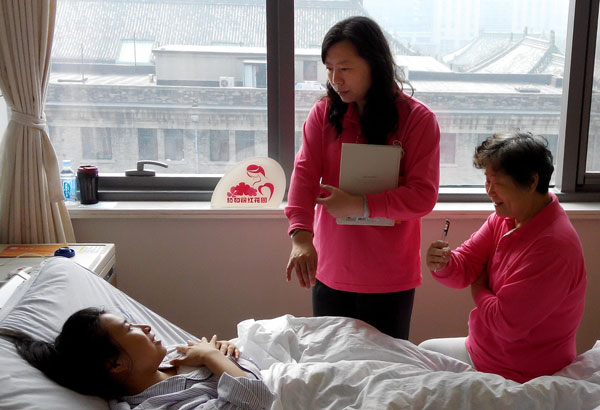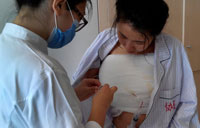 |
|
A volunteer (center) from an organization that provides advice for women with breast cancer talks with a patient after surgery in a Beijing hospital. Zou Hong / China Daily |
 |
| Surge in breast cancer rate in Beijing? |
 |
| Debate rages over cost-effective screening methods for disease? |
The 26-year-old had a malignant tumor removed from her left breast in April 2013, but when a second growth was detected earlier this year, the physicians at the hospital's breast surgery clinic, who noted there was no history of cancer in Hong's family, suggested a gene test. The results indicated a risk of genetic mutation, so Hong opted to have a preventative double mastectomy. The surgery was performed earlier his month.
"I had the same test as Angelina Jolie. It's cool, isn't it?" Hong said with a wry smile, looking down at the bandages wrapped around her chest and the two thick tubes that carried the discharge from her operation scars. When a nurse checked the tubes, Hong writhed in pain. Eventually, she recovered her composure. "God is fair. He took my breasts away one day before my birthday, but he also gave me a beautiful family. I think all these things are teaching me to be brave," she said.
Incidence rate climbing
Breast cancer is the No 1 cause of death among female cancer patients in China. In Beijing alone, the incidence rate has climbed by 4.6 percent annually in the last two decades, more than double the annual global average of 2 percent.
More than 3 million new cases of cancer were reported in China in 2010, meaning about six people were diagnosed with some form of the disease every minute of the year, according to the latest available data from the China Cancer Registration Center.
In the United States and Europe, women aged 60 to 70 are most at risk of developing breast cancer. Statistics collated at several research institutes in China between 1999 and 2008 show that about 40 percent of patients were diagnosed with the disease between the ages of 40 and 50.
"In China, we pay more attention to checking 'young' breast cancer patients, those aged 40 to 50," said Guan Jinghong, a surgeon at the clinic.
"Those patients are still young enough to get the most out of life, but a cancer diagnosis means they may encounter problems if they try to conceive or breastfeed. It may even lead them to feel embarrassed about their bodies when they're engaged in sexual activity with their partners. We should pay more attention to preventing the disease and to treating it if it does develop," Guan said.
According to Sun Qiang, director of the clinic, the fact that women in China are diagnosed at an earlier age than those in some other countries doesn't necessarily mean that they will beat the disease.
"The problem in China is that many cases - about 70 percent - are detected too late. That means a large number of patients miss the 'golden period' for treatment that could save their lives," he said.
Successful surgery and advanced clinical treatment mean the survival rate for patients whose cancer is deteted early is much higher - as high as 90 percent within five years after treatment - than for patients with lung or stomach cancer.
Yuan Zi discovered she had breast cancer in July 2009, when an ultrasound scan detected a tumor 0.4 centimeters in diameter during the annual health check provided by her company. At first, she refused to be alarmed. "I was complacent about the problem. I didn't realize it was a big deal until a second exam proved that the lump was malignant, by which time it had grown to 1 cm," the 46-year-old said.
Yuan was fortunate. Her condition wasn't severe enough to require a mastectomy, so the tumor was removed and she had breast-conserving surgery. The cancer is now in remission, and if that remains the case at the end of this year the chances of it reappearing will be extremely low.
"Nowadays, more patients are choosing breast-conserving surgery if their condition allows it. A decade ago, a 30-year-old patient might choose to lose the breast, even if it wasn't strictly necessary. But now, people's attitudes have changed. They want a good-quality future, instead of just staying alive," Guan said.
A new lease on life
Every year, 210,000 new cases of breast cancer are reported in China, and 50,000 of them prove fatal. However, for many survivors the mental anguish of losing a breast can provoke feelings of inadequacy and diminished femininity they are unable to deal with on their own.
Zheng Minghui, an expert on breast reconstruction at the Chang Gung Medical Foundation in Taiwan, said surveys conducted by a number of breast cancer clinics indicate that every patient becomes depressed following a mastectomy.
He said 30 to 50 percent of women complained that their sex lives were not as satisfying as before the operation, and 40 percent said they had become less willing to participate in social activities.
"Reconstructive surgery has been widely adopted in the US and many European countries. But it's still not popular in China," he said.
In Taiwan, 7 in 100 breast cancer patients choose to undergo reconstructive surgery, compared with a rate of 3 percent in Japan. Surgeons at the Peking Union Medical College Hospital performed 1,300 breast-cancer operations last year, but only 5 percent of patients opted for reconstructive surgery.
One reason this form of surgery is less popular in China is that it isn't covered by medical insurance, Zheng said. Moreover, it takes women a long time to decide if they want the operation. "It's a plastic operation that isn't widely accepted by Chinese women, but it can help restore the confidence of those who have lost a breast because of cancer," he said.
In addition to purely physical treatments, psychological counseling is becoming an important part of the recovery process. In 2009, the Peking Union Medical College Hospital organized a volunteer group called Pink Garden where, under the guidance of the medical staff, survivors advise and act as sounding boards for patients.
Yuan Zi joined the group during her post operative period, and later became a counselor. She believes the strength she gained from talking to her counselor was a crucial element in her recovery. "My anxieties about chemotherapy were driven away by her experience. A small potted plant on the windowsill reminded her how wonderful life can be, despite the pain," Yuan said.
"So, during my chemotherapy sessions, I told myself to hold on for as long as possible, because tomorrow will be another beautiful day."
Contact the writer at yangwanli@chinadaily.com.cn
He Na contributed to the story
